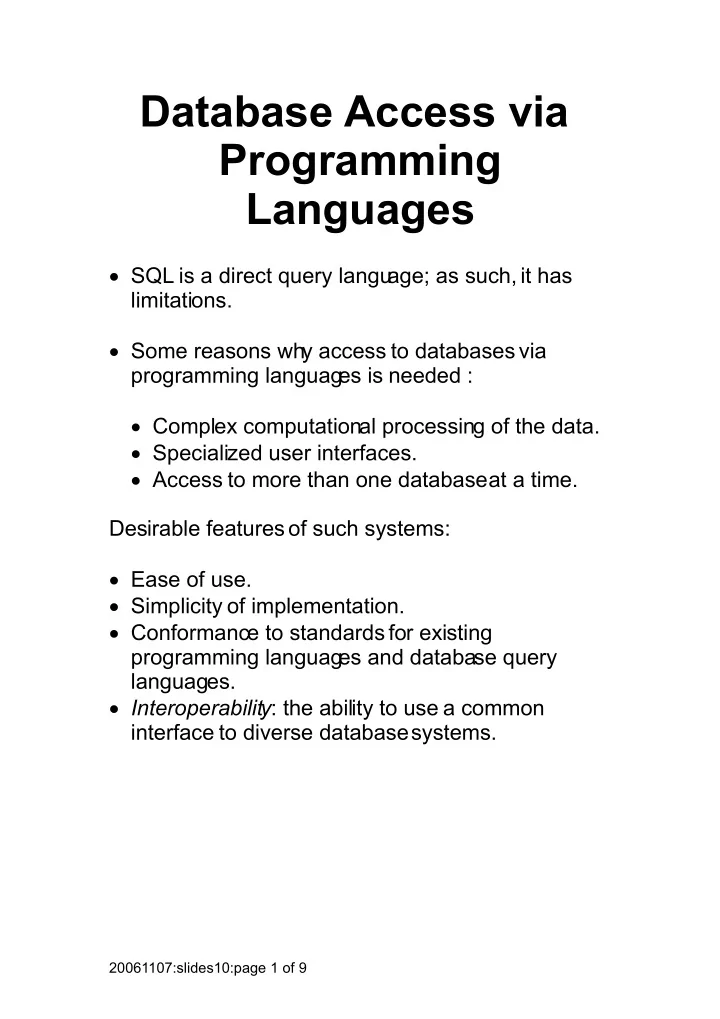

Database Access via Programming Languages · SQL is a direct query langu age; as such, it has limitations. · Some reasons wh y access to databases via programming languag es is needed : · Complex computational processing of the data. · Specialized user interfaces. · Access to more than one database at a time. Desirable features of such systems: · Ease of use. · Simplicity of implementation. · Conformance to standards for existing programming languag es and database query languages. · Interoperability : the ability to use a common interface to diverse database systems. 20061107:slides10:page 1 of 9
A Closer Look at Interoperability · Consider SQL: it is a standard direct query language which may be used with virtually any relational database system. · Question: To what extent can a similar standard be attained which focuses upon embedding SQL-style query support within a powerful programming language? Some desirable properties: · Make use of existing standards for database queries ( e.g. , SQL). · Make use of existing standards for programming languages ( e.g. , C, C++, Ada, etc.) · Make use of existing development environments for programming language s ( e.g., Borland C++, Microsoft Visual C++, Anjuta DevStudio, CodeForge, etc.). · Admit (possibly simultaneous ) access to a diverse collection of database systems ( e.g., Oracle, Sybase, Microsoft, Interbase products) using a common syntax and semanti cs. · Solutions should not depend upon characterist ics of particular operating systems. Rather, they should be available on a variety of systems, such as Microsoft Windows, Mac OS, Linux, and UNIX, without having to depend upon the OS vendor for DBMS-specific support. 20061107:slides10:page 2 of 9
Vendor-specific solutions: · Oracle PL/SQL: A proprietary PL/1-like language which supports the execution of SQL queries: · Advantages: · Many Oracle-specific features, not common to other systems, are supported. · Performance may be optimize d to Oracle- based systems. · Disadvantages: · Ties the applications to a specific DBMS. · The application programmer must depend upon the vendor for the applicat ion development environment. It may not be available for all platforms. · Microsoft VBA (Visual Basic for Applications) support for MS Access: · Advantages: · Uses the common Microsoft applicatio n language VBA. · Disadvantages: · Totally specific to Microsoft systems. Although they have some o bvious advantages, these solutions do not embody interoperability. 20061107:slides10:page 3 of 9
Vendor-independent solutions based upon SQL: There are three basic strategies which may be considered: · Embedded SQL · SQL modules · SQL call level interfaces. 20061107:slides10:page 4 of 9
Embedded SQL: · In this strategy, calls to SQL statements are embedded in a host programming langu age, such as C. Such calls are tagged by a spec ial marker, such as “EXEC SQL.” · A preprocessor is invoked to convert the source program into a “pure” host-langua ge program. The SQL calls are converted to host-language statements via a preprocessor . · In static embedded SQL, table and attribute names must be declared in the source program. · In dynamic embedded SQL, they may be provided at run time. · There is an ISO standard for embedded SQL. Disadvantages: · It is a real pain to debug preprocessed programs. · The use of a program-development environment is compromised substantially . · The preprocessor must be vendor and platform specific. A very simple example of a static embeded SQL program is shown on the next slide. 20061107:slides10:page 5 of 9
/* Skeleton example of embedded SQL in C */ #include <stdio.h> #include <stdlib.h> /* Include communications area */ EXEC SQL INCLUDE sqlca main () { EXEC SQL BEGIN DECLARE SECTION char Lname[16]; char SSN[10]; EXEC SQL END DECLARE SECTION EXEC SQL CONNECT ‘company’; if (sqlca.sqlcode < 0) exit(-1); printf(“Enter SSN: “); scanf(“%s”, SSN); EXEC SQL SELECT Lname FROM Employee WHERE SSN = :SSN; switch (sqlca.sqlcode) { case 0: printf(“Last name is %s.\n”, LName); break; case 100: printf(“No last name for %s.\n, SSN); break; default: printf(“SQL error %d.\n”, sqlca.sqlcode); }; return(0); EXEC SQL DISCONNECT; }; 20061107:slides10:page 6 of 9
SQL Modules: · In the module approach, invo cations to SQL are made via libraries of procedures, rather than via preprocessing. Advantages over embedded SQL: · Clean separation of SQL from the host programming languag e. · Debugging is much more straightforward, sinc e no preprocessor is involved. Disadvantages: · The module libraries are specific to both the DBMS and programming language and environment. Thus, portability is compromised greatly. Is there a standard for such systems? ?? Vaguely, PL/SQL is an example of such a system, although it does not really use PL/1 as the host language. Rather, it is an integrated system. JDBC is perhaps another example, using Java as the host language. Again, it is proprietary . 20061107:slides10:page 7 of 9
SQL Call-Level Interfaces: · A call-level interface provide s a libarary of functions for access to DBMS’s. · The DBMS drivers are stored separately; thus the library used by the programming languag e is DBMS independent. The programming language functions provided only an interface to the DBMS drivers. Advantages: · The development environment is not tied to a particular DBMS, operating sytem, or even a particular development environment. Disadvantages: · Some low-level optimization may be more dif ficult or impossible to achieve. · Key example: · The SQL CLI (X/Open CLI) · Microsoft ODBC (Open Database Connectivity) · The two are closely aligned. 20061107:slides10:page 8 of 9
An oversimplified picture of ODBC: API Call Operating ODBC Prog. Env. System Manager Oracle Driver API Library Sybase Driver System- Access Driver Specific ODBC Drivers Paradox Driver ... SQL Server Driver Local DB Mapping ODBC: Course ODBC: Company Type: Sybase Type: MS Access ... File: F:\DB\x.syb File: F:\DB\c.mdb 20061107:slides10:page 9 of 9
Recommend
More recommend